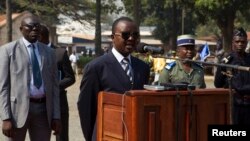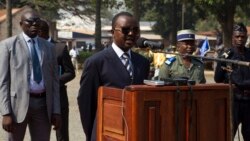Michel Djotodia, who was serving as interim president of the Central African Republic, has resigned following months of deadly violence there. Announcement of the resignation and that of interim Prime Minister Nicolas Tiengaye, came as leaders from the 10-nation Economic Community of Central African States regional bloc met to help settle the crisis, which has cost more than a thousand lives and forced hundreds of thousands to flee their homes. C.A.R.’s transitional assembly, the national transition council, is meeting now to work toward forming a new government.
Chaos and violence have gripped the C.A.R. since late 2012 when the Seleka alliance seized power and removed then-President François Bozize. Since then, the situation has become increasingly anarchic, with Seleka fighters killing, raping and pillaging, and local militias, known as anti-Balaka, forming in response to Seleka abuses, and in some cases carrying out their own abuses against innocent civilians.
The United States remains deeply concerned over the violence. We call on armed groups to disarm and disband, for all parties to show restraint and commit to a path towards peace during this transition, and we fully support the work of the African Union-led stabilization mission, and the French military contingent working with it, to restore peace. We will also continue our support for the humanitarian agencies aiding those in need with food assistance, medical care and other services.
With the National Transition Council now meeting to decide the nation’s future, we urge its members to conduct a transparent and inclusive process that includes all stakeholders in the C.A.R. Its new leaders must be committed to restoring security for all people, abide by the political transition roadmap agreed to in the transitional charter and hold credible democratic elections as soon as possible, but by no later than February 2015.
Chaos and violence have gripped the C.A.R. since late 2012 when the Seleka alliance seized power and removed then-President François Bozize. Since then, the situation has become increasingly anarchic, with Seleka fighters killing, raping and pillaging, and local militias, known as anti-Balaka, forming in response to Seleka abuses, and in some cases carrying out their own abuses against innocent civilians.
The United States remains deeply concerned over the violence. We call on armed groups to disarm and disband, for all parties to show restraint and commit to a path towards peace during this transition, and we fully support the work of the African Union-led stabilization mission, and the French military contingent working with it, to restore peace. We will also continue our support for the humanitarian agencies aiding those in need with food assistance, medical care and other services.
With the National Transition Council now meeting to decide the nation’s future, we urge its members to conduct a transparent and inclusive process that includes all stakeholders in the C.A.R. Its new leaders must be committed to restoring security for all people, abide by the political transition roadmap agreed to in the transitional charter and hold credible democratic elections as soon as possible, but by no later than February 2015.






